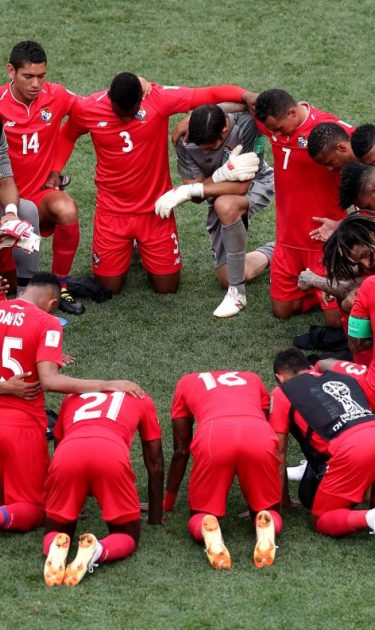When the notes of the Panamanian national anthem filled the stadium in Sochi last week, all the canaleros closed their eyes and sang the lyrics at the top of their lungs. It was a special moment; the first time their anthem had been played in a World Cup. But their passionate rendition had a touch of sadness – they were missing one of their own, taken away by an assassin’s bullets.
Amilcar Henríquez, 33, was shot on a street corner just 50 steps from his house in Colón on April 15, 2017 while playing dominoes with friends. He was rushed to the hospital, but died shortly afterward. His murder shocked Panama and became a reminder that not even national heroes were safe from violence. The crime remains unsolved.
Henríquez was a defensive midfielder known for his energy and sacrifice. He started his career on Arabe Unido, Colon’s team, where he attracted the attention of the national team coach. His performances helped him jump to the Colombian league in 2009, where he reached two finals, one with Atletico Huila and one with Independiente Medellín. From 2014 on, he alternated seasons between second division sides in Colombia and Arabe Unido, where he was playing at the time of his murder.
He was also vital for the national team. He scored the decisive penalty kick that gave Panama its only international cup: the UNAF Cup in 2009. After retiring from international soccer in 2014, he returned to the team in 2015 at the request of the current coach, Hernan Darío “Bolillo” Gómez. His last game with Panama was a 1-1 tie with the United States on March 2017.
He was optimistic about reaching the World Cup. “This is our last chance to put a golden touch on so many years of effort and struggle. Going to the World Cup is the biggest dream, it’s something we all want,” he said in an interview with FIFA.com a few weeks before his death.
“His life’s dream was to play in the World Cup finals. I can’t believe he won’t be there,” his girlfriend Gixiani Peña told British tabloid The Sun. “He would have loved to have been playing against England.”
After his murder, his teammates agreed that the best way to honor his memory was to qualify. “We have to reach the World Cup for him,” said Gabriel Gómez, one of the veterans of the team. Henríquez became their inspiration and their strength in the hardest moments.
Panama and Costa Rica were tied in the 87th minute of the last game of the CONCACAF qualifiers, a score that would have left them out of the World Cup. Luis Tejada headed a long ball into the box, but no one was around to receive it. Suddenly, out of nowhere, center-back Roman Torres arrived to give the ball a subtle touch that went through the hands of the goalkeeper and into the net.
Panama was in the World Cup, and in the celebrations, the team remembered their fallen friend.
“Thanks to the fans, who supported us through the game. I only have kind words for them and for Amilcar, may he rest in peace, who gave us the strength to give it all in the field,” said midfielder Aníbal Godoy to the local channel RPC.
Panamanian police arrested eight people, three of them minors, in relation to the murder of Henríquez and his friend Delano Wilson, who was at his side at the time of the shooting. A third victim survived the attack. The official motive for the crime was attributed to a personal vendetta, but in a city like Colón, with some of the highest murder statistics and gang related crimes in Panama, combined with the violent upbringing of most players, it might be impossible to establish the truth.
Henríquez left behind three children and an unforgettable imprint in the minds of his countrymen. He couldn’t realize his dream of playing in the World Cup, but his memory was with his teammates when the anthem started playing and all through their campaign in Russia.
“We always carry him in our minds and hearts,” said Torres, in an interview with The Associated Press.




